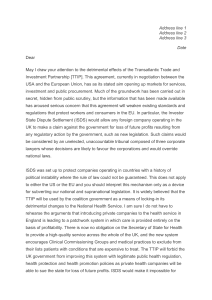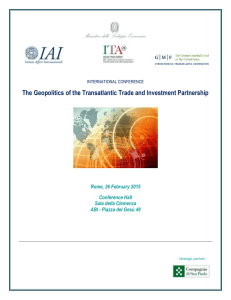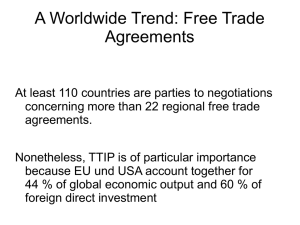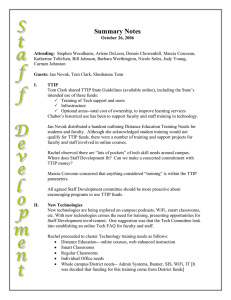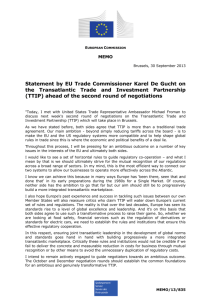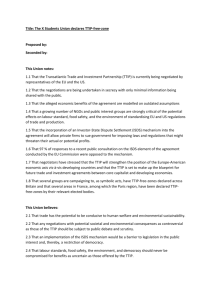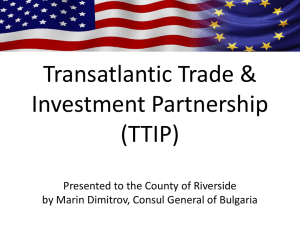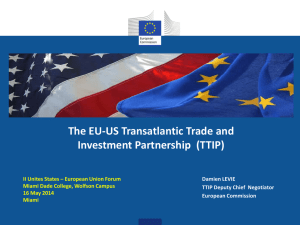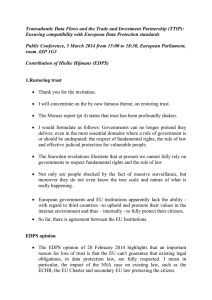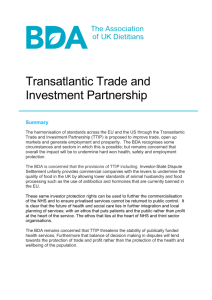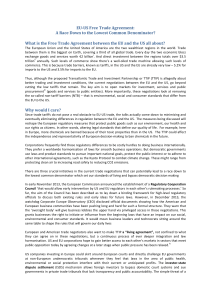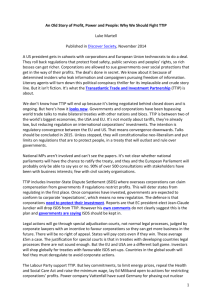"Regulatory cooperation in the TTIP": Civil society stakeholders
advertisement
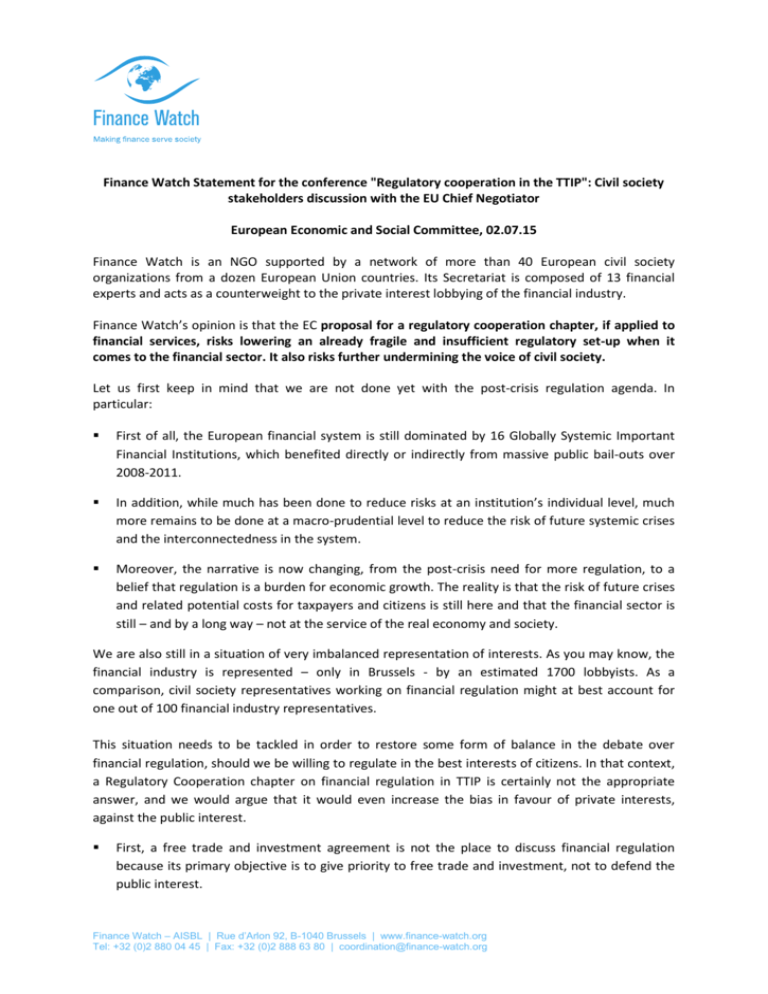
Finance Watch Statement for the conference "Regulatory cooperation in the TTIP": Civil society stakeholders discussion with the EU Chief Negotiator European Economic and Social Committee, 02.07.15 Finance Watch is an NGO supported by a network of more than 40 European civil society organizations from a dozen European Union countries. Its Secretariat is composed of 13 financial experts and acts as a counterweight to the private interest lobbying of the financial industry. Finance Watch’s opinion is that the EC proposal for a regulatory cooperation chapter, if applied to financial services, risks lowering an already fragile and insufficient regulatory set-up when it comes to the financial sector. It also risks further undermining the voice of civil society. Let us first keep in mind that we are not done yet with the post-crisis regulation agenda. In particular: First of all, the European financial system is still dominated by 16 Globally Systemic Important Financial Institutions, which benefited directly or indirectly from massive public bail-outs over 2008-2011. In addition, while much has been done to reduce risks at an institution’s individual level, much more remains to be done at a macro-prudential level to reduce the risk of future systemic crises and the interconnectedness in the system. Moreover, the narrative is now changing, from the post-crisis need for more regulation, to a belief that regulation is a burden for economic growth. The reality is that the risk of future crises and related potential costs for taxpayers and citizens is still here and that the financial sector is still – and by a long way – not at the service of the real economy and society. We are also still in a situation of very imbalanced representation of interests. As you may know, the financial industry is represented – only in Brussels - by an estimated 1700 lobbyists. As a comparison, civil society representatives working on financial regulation might at best account for one out of 100 financial industry representatives. This situation needs to be tackled in order to restore some form of balance in the debate over financial regulation, should we be willing to regulate in the best interests of citizens. In that context, a Regulatory Cooperation chapter on financial regulation in TTIP is certainly not the appropriate answer, and we would argue that it would even increase the bias in favour of private interests, against the public interest. First, a free trade and investment agreement is not the place to discuss financial regulation because its primary objective is to give priority to free trade and investment, not to defend the public interest. Finance Watch – AISBL | Rue d’Arlon 92, B-1040 Brussels | www.finance-watch.org Tel: +32 (0)2 880 04 45 | Fax: +32 (0)2 888 63 80 | coordination@finance-watch.org Second, regulatory cooperation aims at diminishing the cost of regulatory divergence. But this cost is to a large extent that of the industry, not that of society. It needs to be seen alongside the high cost to society of an inadequately regulated financial system, including the costs of the crisis and its impact on public finances. Third, and as provided by Article 15 of the European Commission textual proposal published in early May, authorities and regulators would have to take stakeholders’ “concrete suggestions for further regulatory co-operation” into account and give them “careful consideration”. This could be welcome, but given the imbalance in stakeholders’ representation, there is a high chance that the financial industry will use this cooperation platform as another means to influence the regulatory process in its own interest. In contrast, civil society groups have limited resources and are already struggling to make their voices heard. Today’s meeting is further evidence of this. Adding another lobby opportunity will just make the imbalance worse. In fact, private interests have a reason to call for more equivalence and harmonisation in regulation, but how will the impact on the economy and on society be assessed? In conclusion, Finance Watch’s position is that financial services should be removed from the scope of the TTIP: Investor protection mechanisms are a clear step back from a public interest perspective and they should not be included in the TTIP – nor in any other (trade and) investment agreement, as they risk undermining states’ willingness and ability to regulate, reduce or even ban some activities and practices deemed harmful. Market access rules aim to further liberalise the financial sector, whereas it is broadly acknowledged that excessive deregulation and liberalisation are some of the main causes of the financial crisis and the dramatic economic and social consequences we know and are still struggling with. Regulatory cooperation should not be included in a free trade and investment agreement, as it further opens the regulatory process to private interest lobbying. In short: when it comes to financial services and financial regulation, the TTIP is another step in the wrong direction. If anything, the trade-off between the risks for society and the marginal and hypothetical future gains that TTIP would bring in terms of GDP growth does not seem to be a good one. Finance Watch – AISBL | Rue d’Arlon 92, B-1040 Brussels | www.finance-watch.org Tel: +32 (0)2 880 04 45 | Fax: +32 (0)2 888 63 80 | coordination@finance-watch.org
